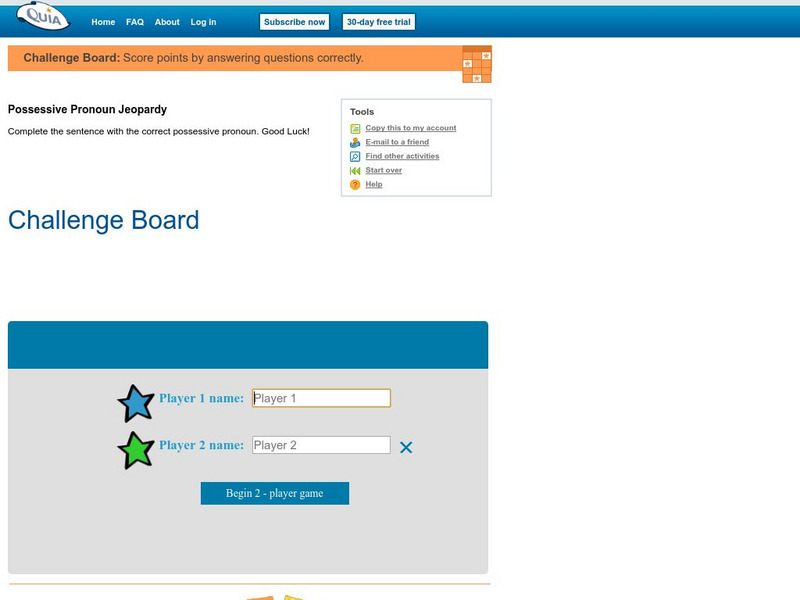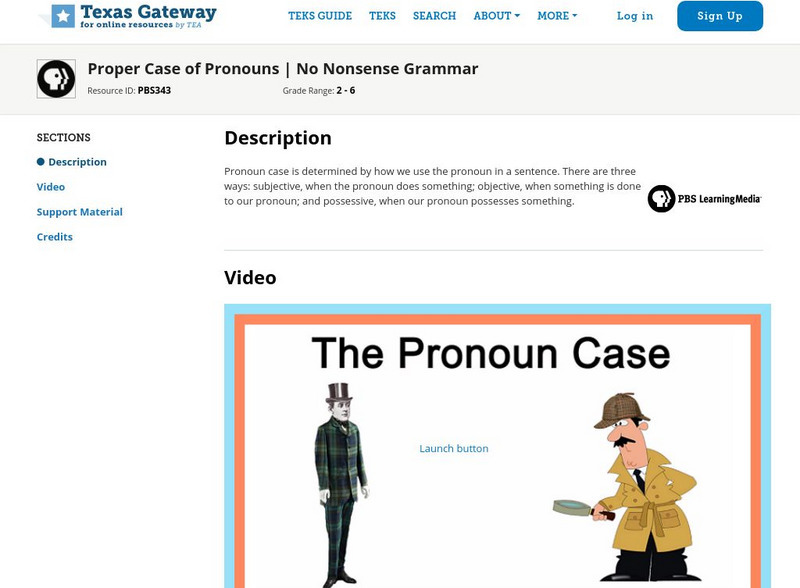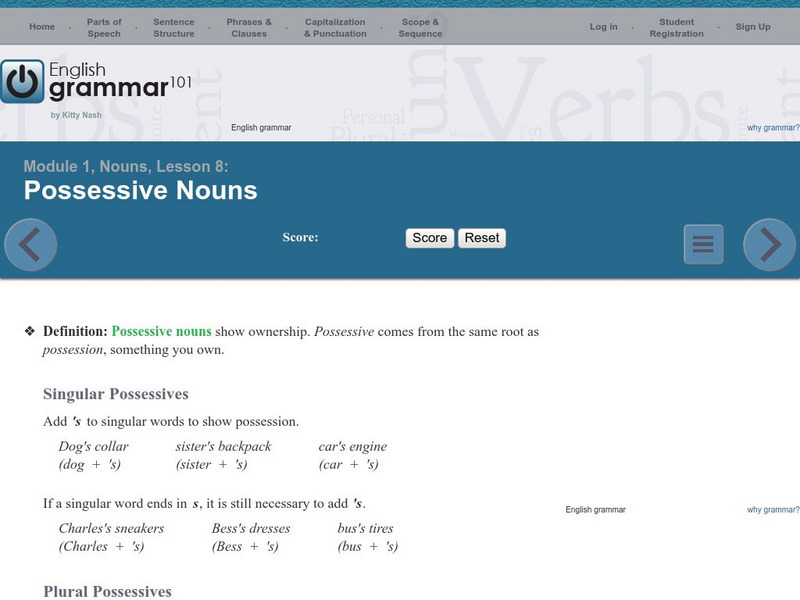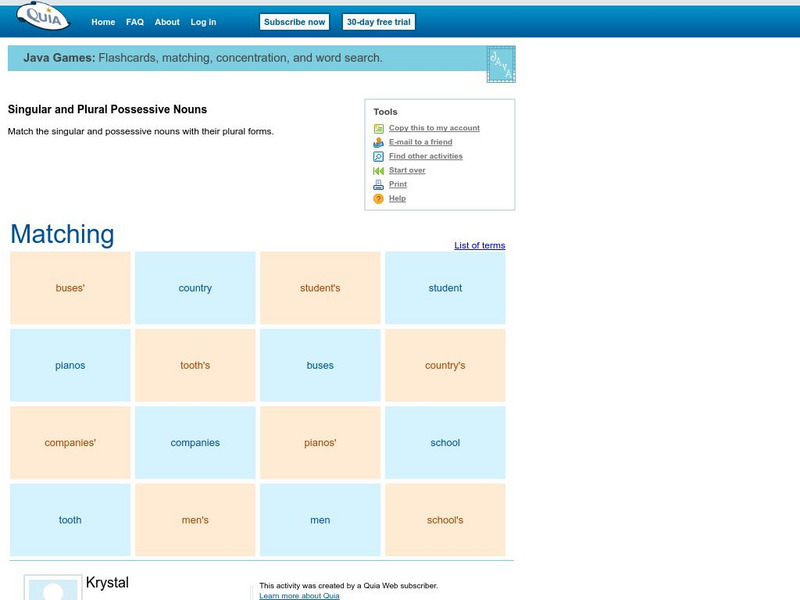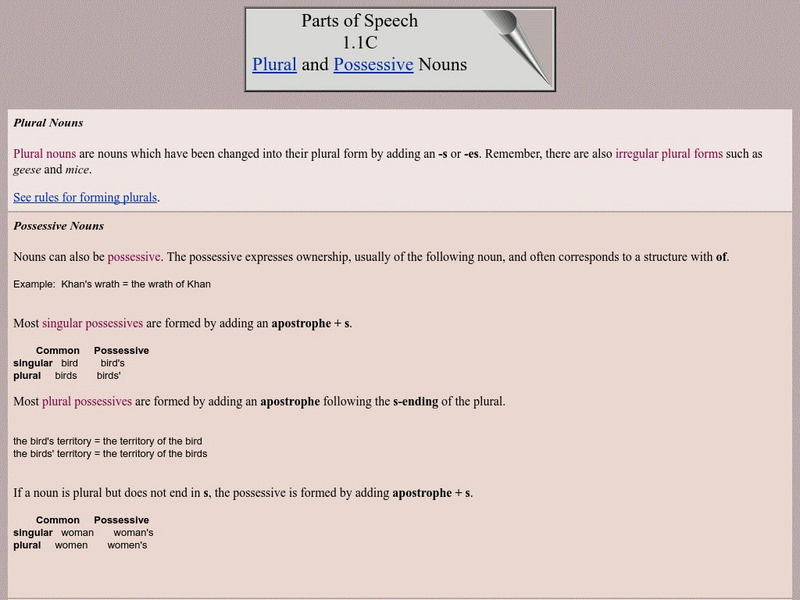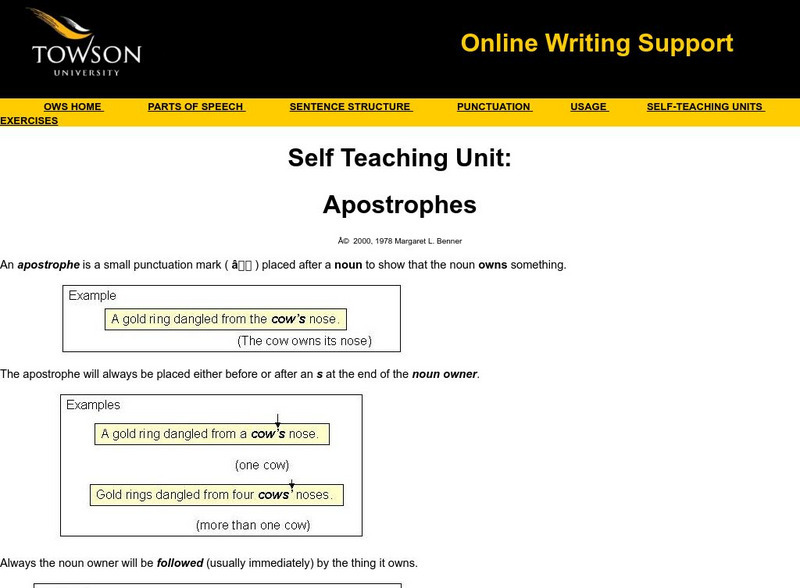Other
Adele's Esl Corner: Possessive Pronouns
Replace the possessive nouns in each sentence with the appropriate possessive pronoun.
ClassFlow
Class Flow: Possessive Pronouns
[Free Registration/Login Required] This flipchart will help students to understand the correct use and spelling of possessive pronouns.
Quia
Quia: Possessive Pronoun Jeopardy
Choose the correct possessive pronoun to complete each sentence as you complete against another player in this Jeopardy-style game.
Texas Education Agency
Texas Gateway: Proper Case of Pronouns | No Nonsense Grammar
Pronoun case is determined by how we use the pronoun in a sentence. There are three ways: subjective, when the pronoun does something; objective, when something is done to our pronoun; and possessive, when our pronoun possesses something.
Online Writing Lab at Purdue University
Purdue University Owl: Possessive Pronoun and Apostrophe
This Purdue Online Writing Lab article explains the three uses of the apostrophe.
Language Guide
Language Guide: La Posesion
A basic explanation of pronouns used to show possession. Examples are interactive audio files for modeling correct pronunciation. A link to a practice quiz is provided.
Sophia Learning
Sophia: Apostrophe Guidelines for Possessives
This lesson explains the use of apostrophes to form possessives.
Vocabulary Spelling City
Vocabulary Spelling City: Match It: Sentence Game: Plurals and Possessives
Fill in the blanks in seven sentences by matching the plural or possessive noun that completes each sentence.
Other
English Grammar 101: Possessive Nouns
Online grammar lesson gives an explanation of possessive nouns with follow-up practice exercises. Immediate feedback is provided.
Soft Schools
Soft Schools: Possessive Noun Quiz
In this Possessive Noun Quiz students read a sentence and choose the correct spelling of the possessive noun that fits in the blank. There are 12 questions in this quiz.
Quia
Quia: Singular and Plural Possessive Nouns
Match singular and possessive nouns with their plural forms in this click and match game. Java is required.
Quia
Quia: Singular and Plural Possessive Nouns
Flashcards offers an electronic version of flashcards to practice singular and plural possessive nouns. On the front of each card is a noun; click on the card to reveal the possessive of that noun.
University of Calgary
University of Calgary: Parts of Speech: Plural and Possessive Nouns
A tutorial explaining the proper apostrophe use of singular and plural possessive nouns followed by a twenty-question exercise to practice this skill.
Vocabulary Spelling City
Vocabulary Spelling City: Sentence Writing Practice: Plurals and Possessives
Write a sentence containing each of the twenty-four plural and possessive words listed. When finished, create a PDF of the sentences to print and share.
ClassFlow
Class Flow: Possessive Perfection
[Free Registration/Login Required] This flipchart explains the rules for singular, plural and irregular possessives. Students are given an opportunity to identify and create correct possessive forms.
ClassFlow
Class Flow: Plural Possessive
[Free Registration/Login Required] With this lesson students will be able to identify and use plural possessive nouns.
Blackdog Media
Classic Reader: "Unlawful Possession" by George A. Birmingham
Read the full text of "Unlawful Possession" by Irish clergyman and author George A. Birmingham.
English Worksheets Land
English Worksheets Land: Common, Proper, and Possessive Noun Worksheets
This resource looks at the different classifications of nouns - common, proper, and possessive. These worksheets help students understand the use of each of these different types of nouns.
Blackdog Media
Classic Reader: "A Question of Possession" by Andy Adams
Text of the short story "A Question of Possession" by Andy Adams, an American author in the genre of western fiction. (Free site registration offers some additional features, e.g., the ability to insert annotations.)
SUNY Empire State College
Empire State College: Apostrophes
This resource looks at the three main uses of apostrophes: to take the place of deleted letters; to show possession; and to show plurals of letters, numbers, symbols, abbreviations and words used as words.
Towson University
Towson University: Online Writing Support: Self Teaching Units: Apostrophes
This module explains how to use apostrophes to form possessive nouns and pronouns, provides links to exercises for each new idea, and a link to a post lesson quiz.
Capital Community College Foundation
Guide to Grammar and Writing: Cases of Nouns and Pronouns
In this writing and grammar tutorial, learn how to distinguish and use nouns and pronouns in English and whether they are subjective, nominative, possessive, or objective.
University of Ottawa (Canada)
U of Ottawa Hyper Grammar: Punctuation
Writing center tutorial for how to correctly use various types of punctuation, including the apostrophe in contractions, possessives, and pronouns.
Get It Write
Get It Write: Making Proper Names Plural but Not Possessive
This tutorial explains how to make your last name plural when sending greetings from your entire family (or anytime you are talking about your entire family.) This is a very common grammatical problem, and it is explained clearly here....




